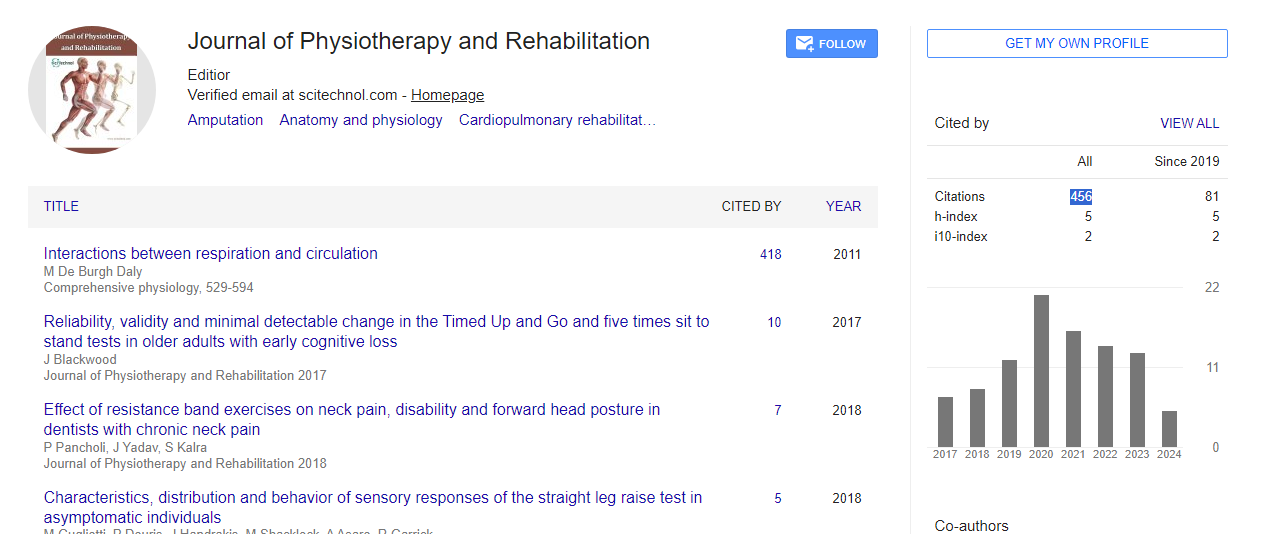Perspective, J Physiother Rehabi Vol: 7 Issue: 5
The Analytical Evaluation of Physiotherapy Techniques
Shari Linda*
1Department of Physiotherapy, Trinity University for Health Sciences, Dublin, Ireland
*Corresponding Author: Shari Linda,
Department of Physiotherapy, Trinity
University for Health Sciences, Dublin, Ireland
E-mail: sharlin@tud.ie
Received date: 24 September, 2023, Manuscript No. JPTR-23-121682;
Editor assigned date: 27 September, 2023, PreQC No. JPTR-23-121682 (PQ);
Reviewed date: 11 October, 2023, QC No. JPTR-23-121682;
Revised date: 18 October, 2023, Manuscript No. JPTR-23-121682 (R);
Published date: 25 October, 2023, DOI: 10.4172/JPTR.1000158
Citation: Linda S (2023) The Analytical Evaluation of Physiotherapy Techniques. J Physiother Rehabi 7:5.
Description
Physiotherapy, often referred to as physical therapy, is a healthcare discipline aimed at optimizing physical function and quality of life through various therapeutic interventions. These interventions encompass a wide range of techniques and approaches, rendering the field of physiotherapy versatile. Analyzing the effectiveness of physiotherapy techniques is essential for ensuring the best possible outcomes for patients.
Evidence-Based Practice (EBP) forms the foundation of contemporary healthcare, including physiotherapy. It involves the integration of clinical expertise, patient values and preferences, and the best available evidence when making clinical decisions. Analytical evaluation of physiotherapy techniques plays a pivotal role in generating this evidence.
Randomized Controlled Trials (RCTs) are considered the gold standard in clinical analysis. They involve patients who are chosen at random into treatment and control groups and comparing outcomes. In physiotherapy, RCTs assess the effectiveness of specific interventions, such as exercise regimens or manual therapies, by measuring changes in patient outcomes like pain reduction, mobility improvement or enhanced function.
Systematic reviews collect all relevant studies on a particular topic, providing a comprehensive overview of existing evidence. Metaanalyses take this a step further by statistically combining data from multiple studies to arrive at more robust conclusions. These methods are valuable in summarizing the overall effectiveness of physiotherapy techniques.
Observational studies, including cohort studies and case-control studies, are used when conducting RCTs is not feasible or ethical. These studies can provide valuable inputs into the long-term effects of physiotherapy interventions, as well as rare adverse events.
Analytical evaluation goes beyond clinical analysis. It also involves assessing patient-reported outcomes, such as quality of life, satisfaction with treatment and perceived improvement. Physiotherapists use standardized outcome measures to quantify these aspects, helping to customize treatment plans to individual patient needs.
Besides clinical effectiveness, physiotherapy techniques are also evaluated for their cost-effectiveness. Cost-effectiveness analyses weigh the costs of treatment against the health benefits gained. These assessments help inform healthcare policy and resource allocation decisions.
Analytical evaluation of physiotherapy techniques significantly impacts patient care by optimizing treatment plans. Physiotherapists, through rigorous assessment, can identify the most effective techniques customized to individual needs, increasing the likelihood of successful outcomes. This evaluation also plays a vital role in reducing ineffectual interventions, keeping patients safe from unnecessary treatments that may not provide significant benefits.
The emphasis on evidence-based practice raises the overall quality of physiotherapy care, instilling confidence in patients that their treatments are supported by scientific analysis, leading to better outcomes and higher satisfaction. Informed decision-making by physiotherapists, guided by analytical evaluation, ensures the efficient utilization of resources and improved patient care. Additionally, continuous analytical evaluation drives advancements in this field, discovering new techniques and refining existing ones, ultimately providing patients more effective and innovative treatments.
Analytical evaluation in physiotherapy, is important for evidencebased practice, faces a variety of obstacles. The diversity of physiotherapy techniques poses a significant hurdle, demanding prioritization based on clinical relevance and available resources for comprehensive evaluation. Patient variability, influenced by diverse characteristics and preferences, adds complexity to studies, necessitating careful consideration in both design and interpretation.
Resource constraints pose logistical challenges in conducting highquality analysis, involving tasks like securing funding, participant recruitment and maintaining long-term follow-up. Additionally, ethical considerations arise, particularly when the treatments are involved in certain physiotherapy techniques, prompting questions about the ethicality of providing suboptimal care to control groups in clinical trials. These challenges collectively highlight the complex terrain of analytical evaluation in physiotherapy analysis.
Conclusion
Analytical evaluation of physiotherapy techniques is the foundation of the evidence-based practice in this field. It ensures that treatments are rooted in scientific evidence, leading to better outcomes and higher quality care for patients. By continually assessing and refining physiotherapy interventions, clinicians can open up fresh opportunities for improving physical function, reducing pain and enhancing the overall well-being of individuals undergoing rehabilitation or seeking to prevent injuries. It is a dynamic process that drives progress in physiotherapy, ultimately benefiting patients of all ages.
 Spanish
Spanish  Chinese
Chinese  Russian
Russian  German
German  French
French  Japanese
Japanese  Portuguese
Portuguese  Hindi
Hindi 